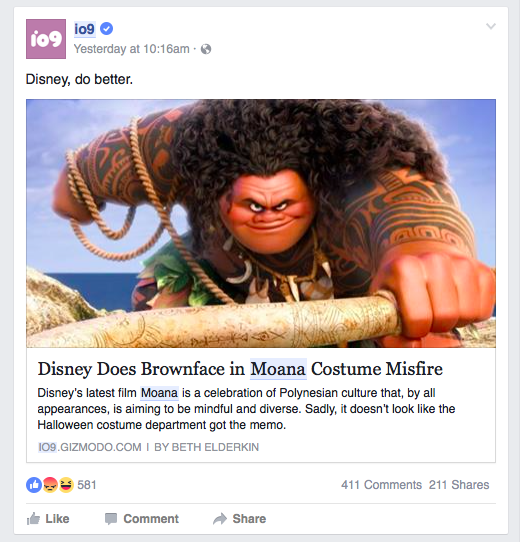Yesterday, I read an article on io9 about a new Disney Halloween costume from the upcoming
Moana:
Basically, kids can dress-up like The Rock's character, Maui, from the film:
The costume allows the wearer to don the "signature tattoos" as well as the rope necklace and the island-style skirt.
The controversy, however, comes from the fact that the "skin" of the costume is brown, leading many (but not all!) online to descry the costume as "cultural appropriation" and allowing children to blatantly practice
brownface. The Buzzfeed article, "
People Are Angry About This Disney Costume," captures some of the Twitter reactions.)
Before I go any further, let me make this clear:
I do not condone brownface or blackface or cultural appropriation.
We good?
Okay.
What I'm interested in is the line between cultural appropriation and, say, something like cosplay. or even the fact that we live in a melting pot of cultures and the blurring of cultural lines is going to happen. And, as Jenni Avins put it in a piece for The Atlantic, "No matter how much I love cable-knit sweaters and Gruyere cheese, I don’t want to live in a world where the only cultural inspiration I’m entitled to comes from my roots in Ireland, Switzerland, and Eastern Europe."
I'd like to think that I'm not the only one to struggle with this question--and I'd also like to think that my struggle, at the very least, means that I'm not blind to the issue and am aware that it exists.
But when something like this Moana costume incident happens, I don't quite know what to think. My knee-jerk reaction is to say, "It's just a kid's costume," but I realize that that knee-jerk reaction is part of the problem.
Also part of the problem: the fact that the film hasn't been released yet, and therefore, I don't know how Moana portrays Polynesian culture.
The way I understand it,
from Nadra Kareem Nittle's helpful article, "cultural appropriation" happens when there's the "unauthorized use of another culture's dance, dress, music, language, folklore, cuisine, traditional medicine, religious symbols, etc." -- and usually involves a dominant culture exploiting a minority culture. Nittle identifies cultural appropriation as problematic because it (1) "robs minority groups of the credit they deserve" (due to association with the majority group) and (2) reinforces stereotypes about the minority groups. Nittle also points out that cultural appropriation is particularly egregious around Halloween, when people don stereotyped costumes without knowing the "roots of such dress and the challenges those who originated it have faced in Western society."
The last part is particularly troubling about the Maui costume.
My first thought was that his size was to help portray him as a demi-god -- as larger than life. That being said, I fully realize that I'm saying this from a position of relative privilege as a white woman and not as a member of the culture being stereotyped. If the people from the Polynesian/Pacific Islander culture think it's offensive, end-stop.
So obviously the accusations of Disney using another culture's dress/folklore with authorization have some merit but again, the issue of the Halloween costumes makes me think -- especially the issue of kids' costumes.
I'm not sure what the right answer is -- or if there even is a right answer. But here are some of the things marinating in my mind:
- If the costume is offensive, is there an alternative?
- What if Disney didn't have a Maui costume? Would they get accusations of being racist for not offering a Halloween costume for a minority character while you can buy costumes for Snow White and Cinderella?
- The brown skin sleeves of the costume are a vehicle for the tattoos -- is the answer to offer the costume in different sleeve colors (e.g. a Maui with white sleeves, black sleeves, etc.)?
- Would a "white Maui" costume then be subject to accusations of white-washing?
- Could they have made the costume sleeves "sheer" so that a child's natural skin color showed?
- I have to believe that if a child wants to dress up as Maui or Moana for Halloween, it's because they like the character right and want to emulate him/her? And not because they want to appropriate a culture? But is that how cultural appropriation starts?
- When we see little girls dressed as their favorite princess at Disney World, do we call it cultural appropriation?
- What if my daughter wants to dress up as Jasmine or Tiana because they're her favorite princess? What do I do then? (I'm assuming we can't have a super detailed conversation about cultural appropriation at three years old, although I have no doubt I will be more "academic" about the Disney films than most parents....)
- How is cultural appropriation different from cosplay (which is defined as "the art or practice of wearing costumes to portray characters from fiction, especially from manga, animation, and science fiction")?
- Does the "fiction" qualification excuse cultural appropriation? Surely not. After all, fiction and culture are intimately connected so...if an American cosplays as a character from Japanese anime, is it cultural appropriation?
I would honestly love some insight on this topic: what if my daughter, exposed as she will be to the full canon of Disney movies, wants to wear a Tiana dress when we go to Disney World? Or a Jasmine outfit? (Assuming, of course, that my daughter is one who likes princesses and wearing dresses...I didn't when I was 4.) What's the right way to handle that situation?















